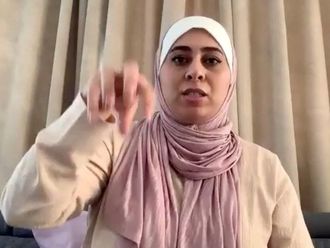Beirut: Marwan Hammadi, a Rafik Hariri ally who escaped an assassination attempt, resumed his testimony at the UN-backed Special Tribunal for Lebanon (STL) that is prosecuting under Lebanese criminal law four Hezbollah operatives for the February 14, 2005 murder of the former Prime Minister.
Hammadi provided riveting details throughout the week, answering questions from the defence team, focusing on two specific points: developments following the extension of President Emile Lahoud’s term as well as his own meeting with Hezbollah Secretary-General Hassan Nasrallah.
Poised and serene, the deputy revealed that while an investigation was launched into the assassination attempt against him, “Syrian officials took away the files and transported them to the headquarters of Syrian intelligence in Anjar” [Syria’s military centre in the Beka’a Valley throughout the period of Syrian control]. The linkage was important because Hammadi asserted that Damascus was determined to crush the political opposition that had gathered steam in Beirut.
Soon thereafter, politicians that belonged to various groups, including the Democratic Gathering, Democratic Renewal Movement, Democratic Left Movement, Qornet Shehwan gathering, and various independents loyal to Hariri, united against the Ba‘ath onslaught on Lebanon. Hammadi elucidated that members of the alliance tackled ways to confront Syria especially after September 3, 2004, when Hariri worked to form a moderate national unity cabinet that would “sway the power balance in Lebanon’s favour against Syria.”
The affable deputy confirmed that Hariri failed to dissuade Bashar Al Assad even after he signed on to Lahoud’s additional three-years mandate at the helm of the State.
Hariri “was [notified] on October 20, 2004, added Hammadi, that forming a cabinet was no longer viable and that he must resign.”
Ironically, the anti-Hariri campaign did not end because, the Druze politician asserted, what Damascus wanted was to permanently deter Hariri from running in the 2005 elections or, if that were not possible, to force him to “ally himself with pro-Syrian figures.”
Undeterred, Hariri looked forward to the 2005 parliamentary elections to thwart Syria’s ambitions in Lebanon, which he assumed he would win in a landslide.
On Wednesday, Hammadi revealed that he secretly met Hassan Nasrallah, to inquire about the attempt on his own life.
“I met with Nasrallah in late April-early May to ask him if his party was behind [my] assassination attempt,” he told the tribunal.
When the Hezbollah Secretary-General denied any involvement, Hammadi then asked if the party’s ally, Syria, was linked to the attack. Nasrallah answered that he did not know if Damascus was involved, although the mere fact that such a meeting occurred, and that a super-sensitive issue was discussed by the two men and their advisers illustrated the intricacies of Lebanese-Syrian relations where regional, local, sectarian, and parochial interests converged.
Telecommunications databanks issue
Nevertheless, and inasmuch as Nasrallah held various meeting with senior Lebanese officials, including the former Prime Minister a month before the February 14. 2005 assassination, a Hammadi-Nasrallah powwow was unusual.
Hammadi elucidated, moreover, that the Hezbollah Secretary-General visited the Hariri family’s Beirut residence in secret to offer his condolences, which was a bombshell. During a tense cross-examination, the defence team inquired whether Hammadi knew that Nasrallah handed the family a document that revealed Israeli involvement in the Hariri assassination — with Hammadi answering no, he did not know of it — though the Shouf deputy affirmed that many Lebanese did not buy into such a theory and “were upset with the March 8, 2005 demonstration in support and defence of the Syrian regime” that had controlled the country for three decades.
One of the most important developments of the week centred around the hugely controversial telecommunications databanks issue and how their access was controlled after the series of assassinations that stretched between 2005 and 2013.
Under interrogation by defence counsel Vincent Courcelle-Labrousse, Hammadi admitted that as telecoms minister, he “took the lid off the provision of data” according to the agreement signed between the Lebanese government and the UN commission that investigated the Hariri bombing. In fact, the telecom data became a hot political football between March 8 and March 14 alliances, when successive ministers opted to quickly block their release to international investigators. After June 2008, members of the Free Patriotic Movement allied with Hezbollah filled those cabinet posts, and placed strict conditions and barriers to the provisions as to which parts could be shared with the commission as well as the prosecutor.
Observers expected the STL to dig deep into the entire telecom aspect in future hearings, given that Captain Wissam Eid, a brilliant computer engineer and senior terrorism investigator at the Lebanese Internal Security Forces, discovered the links between the four men on trial at The Hague and their controllers. Eid was assassinated on January 25, 2008, most likely because he exposed the telephone intercepts that directly pointed the finger at the web around the four Hezbollah men.
Earlier in the week, the STL decided to add Druze chieftain Walid Jumblatt as well as journalist Ali Hammadi, to the prosecution’s list of witnesses in the Hariri assassination.












